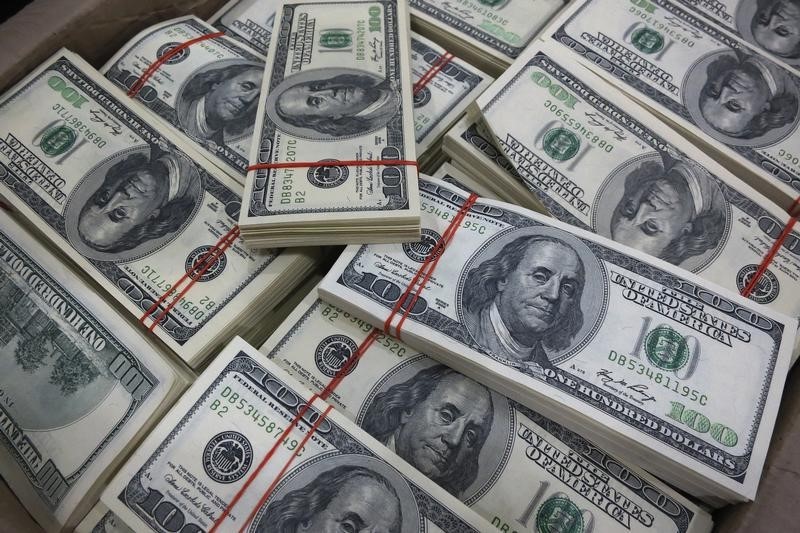By Peter Nurse
Investing.com - The U.S. dollar remained in demand in early European trade Friday ahead of the release of the Federal Reserve’s favorite inflation measure, with interest rates seen staying higher for longer.
At 02:55 ET (07:55 GMT), the Dollar Index, which tracks the greenback against a basket of six other currencies, traded 0.1% higher at 104.588, not far removed from the near seven-week high of 104.78 it hit during the previous session.
The dollar is on course for its fourth consecutive week of gains, trading 0.8% higher so far this week.
Fourth quarter U.S. GDP growth was revised lower during the previous session, but the economic data released this year has painted a stronger picture of the U.S. economy.
A drop in weekly jobless claims showed that the job market remained hot, following on from the extremely strong official jobs report at the start of the month, while retail sales were robust and business activity rebounded to an eight-month high in February.
This all provides more headroom for Fed officials to continue hiking interest rates in an attempt to tame inflation, with the market expecting at least two, and probably three, more increases of 25 basis points this year.
“This backdrop can keep the dollar supported in the near term and potentially into the 22 March FOMC meeting, where the debate will focus on whether the Fed Dot Plots will retain a median view of a 100bp easing cycle in 2024,” said analysts at ING, in a note.
The focus Friday will be on the U.S. core personal consumption expenditures price index for January, the Fed's preferred inflation measure.
The index, due at 08:30 ET (13:30 GMT), is expected to be up 0.4% on a month-on-month basis, a rise of 4.3% on a year earlier, compared with 4.4% the previous month, suggesting inflation is proving to be very sticky.
Elsewhere, USD/JPY traded 0.1% higher to 134.79 after incoming Bank of Japan governor Kazuo Ueda indicated in a speech to the country’s parliament that the central bank will largely maintain its ultra-accommodative policy in the near term, citing a weak economy.
These dovish comments came as Japan’s consumer inflation hit an over 41-year high in January, suggesting Ueda may be pressured into action pretty quickly.
EUR/USD fell 0.1% to 1.0593, close to its six-week low after data released Friday showed that the German economy contracted at the end of the year, shrinking by 0.4% in the fourth quarter of 2022 compared with the previous three months.
GBP/USD rose 0.1% to 1.2018, helped by data showing U.K. consumer confidence rebounded by the most in almost two years in February, with the GfK’s consumer confidence indicator jumping seven points to -38, a 10-month high.
AUD/USD fell 0.2% to 0.6794, NZD/USD fell 0.1% to 0.6220, while USD/CNY rose 0.4% to 6.9366.
